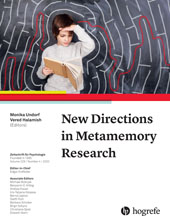Do Learners Spontaneously Monitor Their Memory?
The Gap Between Educational-Developmental and Cognitive-Experimental Research
References
(2018). A meta-analysis and systematic review of reactivity to judgements of learning. Memory, 26(6), 741–750. https://doi.org/10.1080/09658211.2017.1404111
(2003). Why people fail to recognize their own incompetence. Current Directions in Psychological Science, 12(3), 83–87. https://doi.org/10.1111/1467-8721.01235
(2018). Can very small font size enhance memory? Memory & Cognition, 46(6), 979–993. https://doi.org/10.3758/s13421-018-0816-6
(2018). The influence of making judgments of learning on memory performance: Positive, negative, or both? Psychonomic Bulletin & Review, 25(6), 2356–2364. https://doi.org/10.3758/s13423-018-1463-4
(2018). How often are thoughts metacognitive? Findings from research on self-regulated learning, think-aloud protocols, and mind-wandering. Psychonomic Bulletin & Review, 25(4), 1269–1286. https://doi.org/10.3758/s13423-018-1490-1
(2001). Training in metacognition and comprehension of physics texts. Science Education, 85(6), 758–768. https://doi.org/10.1002/sce.1037
(2007).
Metacognition and consciousness . In P. D. ZelazoM. MoscovitchE. ThompsonEds., The Cambridge handbook of consciousness (pp. 289–325). Cambridge University Press.(2011). The ease-of-processing heuristic and the stability bias: Dissociating memory, memory beliefs, and memory judgments. Psychological Science, 22(6), 787–794. https://doi.org/10.1177/0956797611407929
(2016). When asking the question changes the ultimate answer: Metamemory judgments change memory. Journal of Experimental Psychology: General, 145(2), 200–219. https://doi.org/10.1037/a0039923
(2016).
Judgments of learning: Methods, data, and theory . In J. DunloskyS. K. TauberEds., The Oxford handbook of metamemory (pp. 65–80). Oxford University Press.(1998). Promoting general metacognitive awareness. Instructional Science, 26(1), 113–125. https://doi.org/10.1023/A:1003044231033
(1994). Assessing metacognitive awareness. Contemporary Educational Psychology, 19(4), 460–475. https://doi.org/10.1006/ceps.1994.1033
(2015). Judgments of learning as memory modifiers. Journal of Experimental Psychology: Learning, Memory, and Cognition, 41(2), 553–558. https://doi.org/10.1037/a0038388



